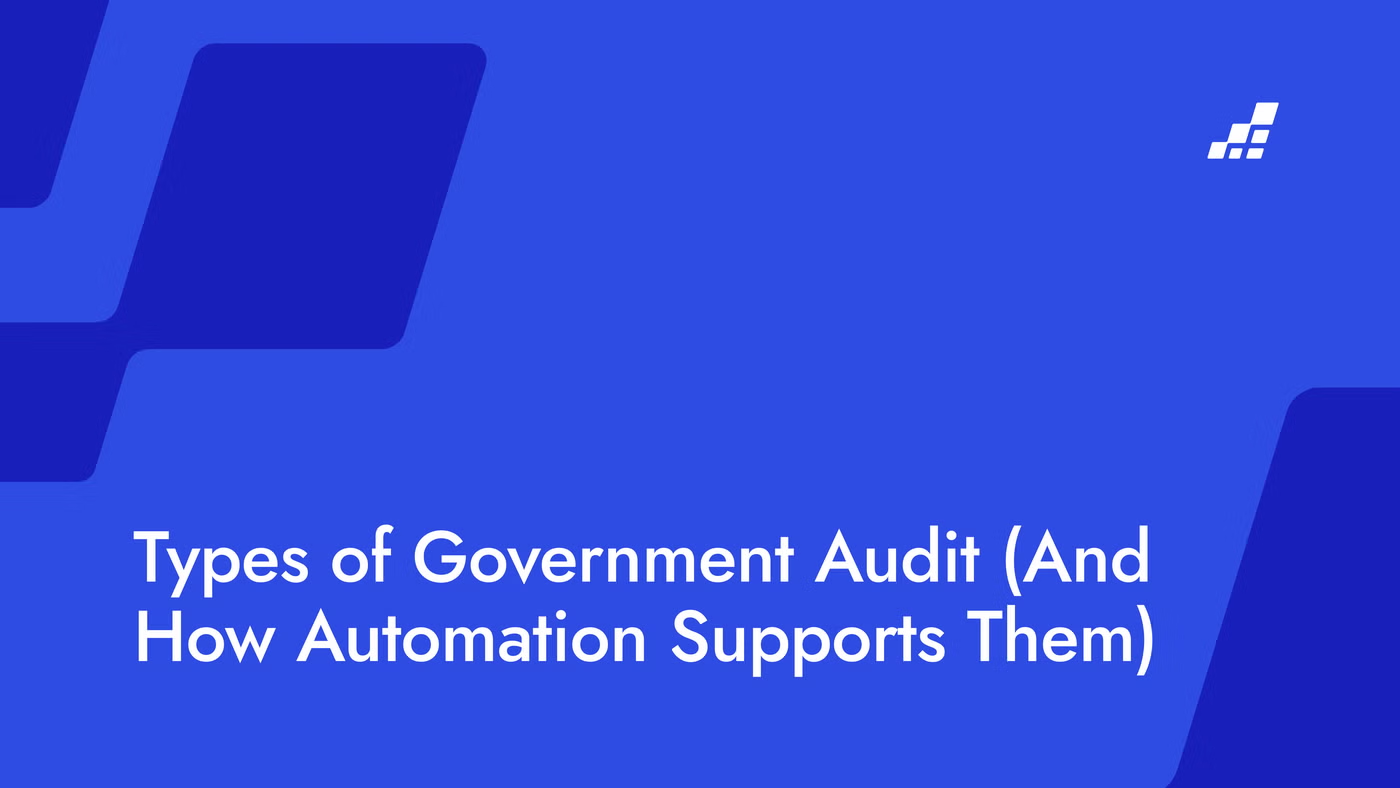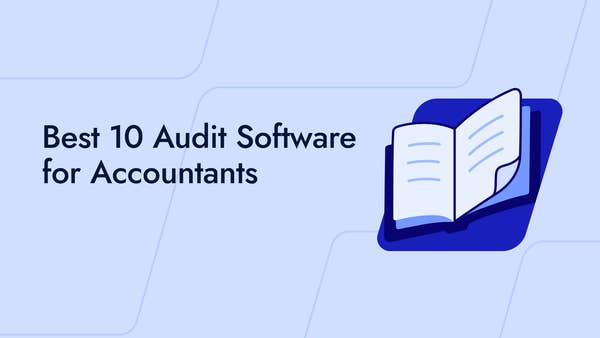- /
- Blog
Types of Governmental Audits (And How Automation Supports Them)

For anyone curious about how public administration works, it's essential to grasp the ins and outs of governmental audits - their types, the process, and the key players and how automation can maximize productivity.
This thorough overview digs into the world of governmental audits, unveiling their meaning, importance, different types, the step-by-step process, and the role automation plays.
Definition and Purpose of Governmental Audits
In the world of governmental audits, independent auditors take the stage, diving into the financial records and operations of public sector organizations. They follow generally accepted auditing standards and specific legal requirements as their guide.
- Financial Statements Accuracy: Assessing the accuracy and reliability of financial statements to ensure a true and fair view of the organization's financial position. This is crucial for maintaining the public's trust and confidence in the government's financial management.
- Performance Evaluation: Evaluating the performance of public sector entities by analyzing key performance indicators and comparing them to established benchmarks. This process identifies areas of improvement and allows auditors to make recommendations for enhanced efficiency and effectiveness.
- Compliance Focus: Focusing on compliance with regulations and laws, auditors examine adherence to legal requirements such as procurement regulations, tax laws, and reporting obligations. This helps prevent fraud, corruption, and other financial irregularities.
Different Types of Governmental Audits
We know the importance of governmental audits in promoting transparency, accountability, and efficiency within government operations. They serve as independent assessments, examining various facets of government activities, including financial management, program performance, and compliance.
Financial Audits
Through financial audits, government entities uphold the integrity of their financial information, offering stakeholders a clear insight into their financial health and stability.
In the detailed process of a financial audit, auditors meticulously go through financial records like balance sheets, income statements, and cash flow statements. They analyze transactions, review supporting documentation, and assess the overall financial management practices of the government entity.
This thorough examination helps pinpoint potential errors, irregularities, or instances of non-compliance with accounting standards.
Performance Audits
Performance audits step outside the realm of finances and zero in on the efficiency and effectiveness of government programs and operations.
These audits evaluate whether stated goals and objectives are being met, how efficiently resources are utilized, and if programs are in line with applicable laws and regulations.
In the course of a performance audit, auditors delve into the processes, procedures, and outcomes of government programs. They gauge how well programs are achieving their intended objectives and pinpoint areas for improvement.
Through performance audits, government entities refine their decision-making processes, uncover best practices, and ensure the efficient and effective use of public resources.
Compliance Audits
These audits are essential to ensure that funds are used according to prescribed requirements and that governments operate within legal and regulatory boundaries.
In the course of a compliance audit, auditors dive into relevant laws, regulations, contracts, or grant agreements, assessing how well the government entity is adhering to them. They meticulously review records, policies, procedures, and practices to identify any instances of non-compliance.
The significance of compliance audits lies in their role in promoting transparency, accountability, and good governance. By ensuring that government entities operate within the established legal framework, these audits contribute to maintaining the integrity of the public sector.
Information Systems Audits
As technology plays an increasingly vital role, information systems audits have become a key component of governmental audits.
These audits delve into the controls and security measures surrounding computer systems and data, evaluating their confidentiality, availability, and integrity. The goal is to pinpoint potential vulnerabilities or weaknesses in the IT infrastructure.
In the course of an information systems audit, auditors thoroughly examine the design and implementation of IT systems. They assess the adequacy of controls and evaluate the effectiveness of security measures. Additionally, auditors review policies and procedures related to data management, access controls, and disaster recovery.
The essence of information systems audits lies in their role in helping government entities safeguard sensitive information, prevent data breaches, and ensure the reliability and integrity of their IT systems.
Why Government Audits Need automation
Here are four key reasons why government audits matter, and why automation strengthens them:
- Transparency contribution – Governmental audits ensure accurate and comprehensive disclosure of financial information, preventing misappropriation of public funds. Automation supports this by linking data to source evidence instantly, giving citizens confidence in truthful and traceable reporting.
- Fraud detection and prevention – Audits identify irregularities and financial misconduct by rigorously testing transactions. Automated tools like DataSnipper speed up these checks and expand sample sizes, reducing the risk of oversight.
- Efficiency and effectiveness improvement – Auditors evaluate performance measures and internal controls to uncover inefficiencies. With automation, these evaluations are completed faster and with more consistency, helping agencies deliver services more effectively.
- Stakeholder assurance – Independent audit findings provide assurance to taxpayers, investors, and citizens. Automation strengthens this assurance by producing defensible documentation trails that stand up to review and scrutiny.
By embedding automation into government audits, public institutions can meet rising demands for transparency and accountability while reducing the burden of manual work.
The Process of Governmental Audits
Planning and Preparation
Audits begin with thorough planning and preparation. This stage involves understanding the auditee’s objectives, identifying risks, setting criteria, and drafting a detailed audit plan. Adequate planning ensures efficiency and effectiveness throughout the process.
Where automation helps: Automation accelerate risk assessment by pulling data directly from source documents into Excel. Auditors can quickly scan contracts, policies, or prior reports to highlight areas of focus, making planning more precise and evidence-based.
Conducting the Audit
Once fieldwork begins, auditors collect and analyze data, perform tests, examine records, conduct interviews, and assess internal controls. This is where the majority of manual effort is typically spent.
Where automation helps: By automating repetitive testing, such as matching invoices to payments or validating grant compliance forms. Instead of combing through thousands of documents manually, auditors can run automated checks and generate clear documentation trails, reducing errors and freeing time for judgment and analysis.
Reporting and Follow-up
At the conclusion, findings are presented to the auditee and stakeholders. The audit report highlights non-compliance, inefficiencies, or areas for improvement, along with recommended actions. Follow-up ensures corrective steps are taken.
Where automation helps: With the right automation in place, reviewers can trace every conclusion back to its source with a single click, strengthening credibility. During follow-up, previously automated procedures can be rerun to confirm corrective actions were implemented.
How DataSnipper Automates Government Audit Tasks
- Financial audit testing – Automates matching of transactions to invoices, receipts, and contracts, cutting hours from reconciliation.
- Grant compliance reviews – Extracts data from standardized forms to quickly validate eligibility and ensure funds were used as intended.
- Single Audit support – Handles large sample sizes by linking source evidence to federal award spending, with clear documentation trails.
- Performance audits – Cross-references operational data and policy requirements to test whether programs meet efficiency and effectiveness goals.
- Control testing – Automates checks for approvals, signatures, and policy compliance, producing consistent and defensible results.
With automation built into Excel, government auditors don’t need to switch tools or overhaul processes. They gain speed, accuracy, and clarity in every step of the audit.
Conclusion
Government audits are expanding in scope and urgency, especially with new legislation driving stricter oversight of public funds.
DataSnipper helps auditors meet these demands by automating repetitive tasks directly in Excel.
With increasing pressure for transparency and accountability, tools that integrate seamlessly into existing workflows matter most.
.png)

